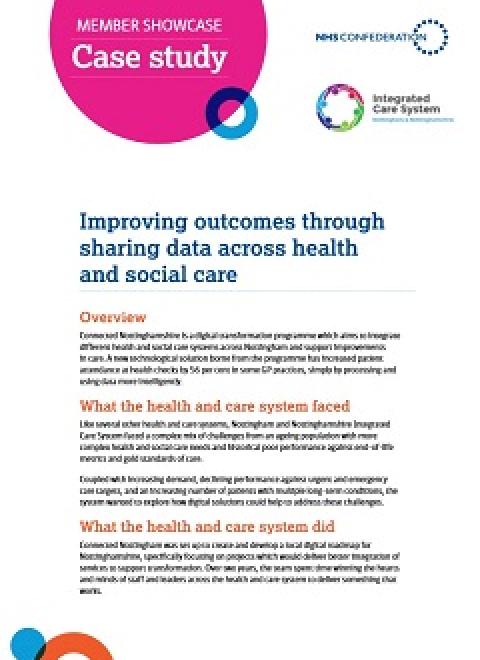Using ‘place’ to do the right thing and solve local issues

Dr Andy Haynes, Nottingham and Nottinghamshire ICS lead, shares his reflections on the transformations seen in mid-Nottinghamshire since they began creating sense of place back in 2014.
We began to create a ‘sense of place’ in Mid-Nottinghamshire in 2014, in response to issues at Sherwood Forest Hospitals NHS Foundation Trust. This developed closer planning and working with clinical commissioning group colleagues, including GPs.
The transformation we saw within the trust complemented changes in the community, which developed trust, fostered collaboration and kick started partnership working. An ensuing alliance of health providers and social care focused on urgent and planned care, long-term conditions and health and wellbeing.
Our shared goals were to improve the health of our community, simplify pathways and remove cost rather than move it around the system.
We learned together from the things that worked and those that didn't. I chaired the Mid-Notts Transformation Board, which created shared methodologies and reporting. This role allowed me to facilitate conversations about difficult areas and decisions.
While we always had an eye on the financial envelope, we didn't allow this to be a barrier to change. Working in this way brought cognitive diversity to the understanding of data, with better decision making.
When the integrated care partnership architecture was created, this brought a wider range of organisations to the discussions and decision making, particularly district councils. This has driven a real focus on local citizens and sharing approaches. This has been enhanced by looking at outcomes at population level using population health management. The development of primary care networks (PCNs) has further enhanced this.
In moving to the integrated care system (ICS) lead role, it has been important to create clear principles for ICP working, which allow the local expertise to deliver while also creating a wider system purpose for the ICS. We need to create a clear process for assessing maturity and supporting budget allocation within a clear governance and reporting framework.
The ICS also has to recognise that constituent ICPs are at different levels of development, taking care not to restrict the most advanced while accelerating the development of those that are less mature.
Organisations, place and neighbourhoods have strong identities, but these can sometimes foster a ‘big brother’ feel to the ICS and can mean it takes longer to establish a single identity for the system. Nevertheless, all senior leaders have a responsibility to embed this sense of system to help staff and the public understand the case for change and what it will mean for them.
Our story is one of doing the right things to solve local issues, building incremental gains and beginning to shift culture, which then aligns to national policy.
Dr Andy Haynes is the lead for Nottingham and Nottinghamshire Integrated Care System. Follow him on Twitter @Dr_Andy_Haynes
Find out more
Gain insights on place-based leadership in Mid-Nottinghamshire on this webinar on 13 March.
Hear from:
- Amanda Sullivan, Accountable Officer, Mansfield and Ashfield CCG and Newark and Sherwood CCG
- Richard Mitchell, Chief Executive of Sherwood Forest NHS Foundation Trust and Executive Lead for Mid-Nottinghamshire ICP
- Dr Andy Haynes, Managing Director of Nottingham and Nottinghamshire Integrated Care System



